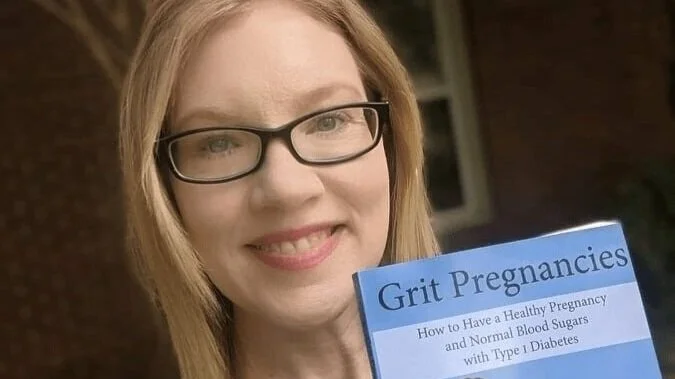This post may contain affiliate links. If you purchase through these links, diaVerge may earn a small advertising commission while not costing you anything additional. Thank you for helping to support our diabetes advocacy work at diaVerge.
We're bombarded with external stimuli and random messages from every direction, yet we rarely take a moment of stillness and focus to silence those external forces and reinforce our own positive messages of health and wellness.
We've all noticed how blood glucose levels can rise quickly and dramatically when we're stressed, overtired or overworked.
Diabetes can also cause depression and feelings of hopelessness. I struggled for years with the idea that I was doing everything I could, yet not getting the results I wanted/expected. Diabetes is relentless, and it can create feelings of isolation, lack of control, and great pessimism. This causes additional stress and makes diabetes management more difficult to manage. It's a vicious cycle.
It might feel silly or seem irrelevant, but if we're not creating our own positive messages to "feed" our brain, we're only consuming the negative, external stressors and unhealthy commercial messages of beauty, success, happiness and the dreaded diabetes "control" (which unfortunately lead to more stress and unhappiness).
We MUST take time away from these stressors to focus on our internal health and wellbeing.
Self-hypnosis, meditation, Mindfulness-Based Stress Reduction (MBSR), and moving meditations such as yoga, qigong and thai chi (among others) create a state of mindfulness and deep relaxation that can help to reduce stress.
What it does:
There are a few different things that come together when you meditate, practice self-hypnosis, or simply enjoy a few moments of quiet mindfulness:
- Deep breathing, which goes hand in hand with all of these techniques, can help to lower your blood pressure and pulse, promoting relaxation and reducing stress.
- Stress reduction is thought have a positive impact on your blood glucose levels and make your blood glucose control easier throughout the day.
- Reduced stress will help to avoid the endorphin cravings that lead you to overeat, eat what you shouldn't or do......
- These techniques can also assist with behavioral lifestyle changes such as quitting smoking and overeating.
A few Techniques:
Dr. Richard K. Bernstein discusses the use of self-hypnosis in Chapter 13 of the book Dr. Bernstein's Diabetes Solution, "How to Curb Carbohydrate Cravings and Overeating" (p. 206).
Based on a method taught to Dr. Bernstein by the famous physician Herbert Spiegel, MD, this chapter details a quick, private way to put yourself into a 20-30 second meditative state, reciting a short message to help you reach your pre-determined goal.
Dr. Bernstein specifically addresses self-hypnosis in relation to controlling overeating, but meditation and self-hypnosis are beneficial to all of us with diabetes.
I discussed stress reduction with Dr. Bernstein during our interview in October 2016. For more information, a description of EMDR and how beta-blockers can help with performance induced hyperglycemia due to stress, please go to part 2 of our interview with Dr. B.
Mindfulness-based stress reduction (MBSR) is a medically based program that was developed by doctors and is taught at medical centers across the country.
"Rooted in Theravada Buddhist vipassana (translated as “insight”) meditation, MBSR is a nonreligious program that focuses on cultivating an enhanced moment-to-moment nonjudgmental awareness of experience. Originally designed to help facilitate adaptation to the stressors of medical illness and assist people in managing stress and pain, MBSR has evolved into a practice that is being applied to a wide variety of health problems as well as being used for general health and overall stress reduction.
MBSR is offered in medical centers, clinics, and hospitals across the United States and abroad and consists of a 2.5-hour/week, 8-week course with a 1-day retreat. Participants receive training in formal mindfulness meditation techniques, including a body-scan meditation, a sitting meditation, and gentle Hatha yoga involving simple stretches and postures. The primary focus of the program is on the progressive development of mindful-awareness through the practice of mindfulness meditation."
Affirmations/messages: An affirmation (or "message" as Dr. B calls it) is a simple phrase or suggestion that you repeat throughout the meditation/self-hypnosis.
Choose a simple message that appeals to you and repeat it continually while practicing your meditation/ self-hypnosis and throughout the day.
Generally speaking, an affirmation is a phrase or suggestion that is repeated frequently and INTERNALIZED. Don't just say it. Think about every syllable, the meaning of the word(s) and the impact it has in your life.
Dr. B recommends that you practice your self-hypnosis and "message" before you eat, before any known problem time (such as afternoon and/or evening snacking) and a total of 10-15 times per day.
I choose an affirmation/message that will reinforce my goals, rather than a negative that can be construed as shame or limitation. A few examples of a positive affirmation:
"My body is healthy and strong. I decide every day to support my health."
"I love my body and I will help keep it healthy and strong."
"My goals are health, strength, love, and peace."
"My body and mind work together to create health."
"My choices affect my health. I will make healthy choices today."
"I can achieve my goals by treating my body with love and kindness"
This might seem silly at first, but it can be a powerful tool for changing the way you think, and ultimately changing your behavior.
Whatever you choose for your phrase/message/affirmation, It should be personally meaningful, and easy to remember & repeat not only during meditation/hypnosis but throughout the day.
Recommendations:
There is not one method that will work for everyone, but I urge you to read more about these techniques, as well as guided meditation, yoga, and thai chi, and try several to determine which works best for you.
If you want a quick, private practice to center your thoughts, try Dr. Bernstein's suggestion of simple self-hypnosis.
If you have more time and would like a deeper sense of calm and relaxation, any of the other methods listed here or within the attached links (below).
If these techniques are new to you, they may feel awkward at first but keep trying. With practice and time, each method will feel more natural.
The potential benefits for your immediate & long-term health are great, it costs nothing and the risks very few (maybe other than falling out of your chair if you fall asleep!)
Take a few minutes today, turn your focus inward, relax, breathe deeply and set your positive affirmation to help with your long-term health.
To learn more:
Follow this link for a very detailed article that discusses various meditation and relaxation techniques and benefits for people with diabetes
Bernstein, R. K., MD. (2011). Dr. Bernstein's Diabetes Solution (4th ed.). New York, NY: Little, Brown and Company.
Jindal, V., Gupta, S. & Das, R. Mol (2013) Molecular Mechanisms of Meditation. Neurobiology 48: 808. doi:10.1007/s12035-013-8468-9
Tanga Y, Lub Q, Fand M, Yange Y, Posnerc M (2012) Mechanisms of white matter changes induced by meditation. PNAS. doi:10.1073/pnas.1207817109
Orenstein, D. (2016, February 23). Everyday mindfulness linked to healthy glucose levels. https://news.brown.edu/articles/2016/02/glucose
Whitebird, R. R., Kreitzer, M. J., & O’Connor, P. J. (2009). Mindfulness-Based Stress Reduction and Diabetes. Diabetes Spectrum : A Publication of the American Diabetes Association, 22(4), 226–230. http://doi.org/10.2337/diaspect.22.4.226 http://www.ncbi.nlm.nih.gov/pmc/articles/PMC2909138/
Do you have a regular meditation or yoga practice?
What results have you noticed in your blood glucose levels, mood, and habits?
Tell us about it in the comments below or at diaVerge Diabetes on FB.
If you like this article, please share it!





